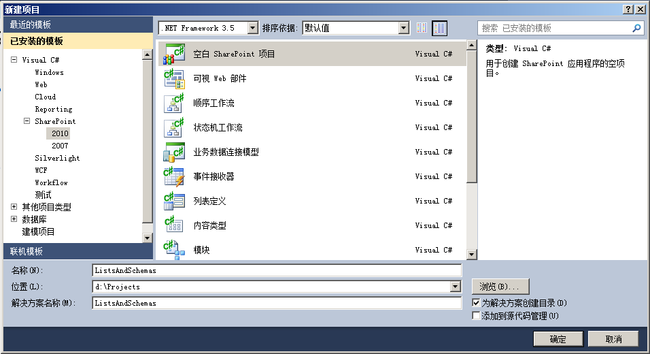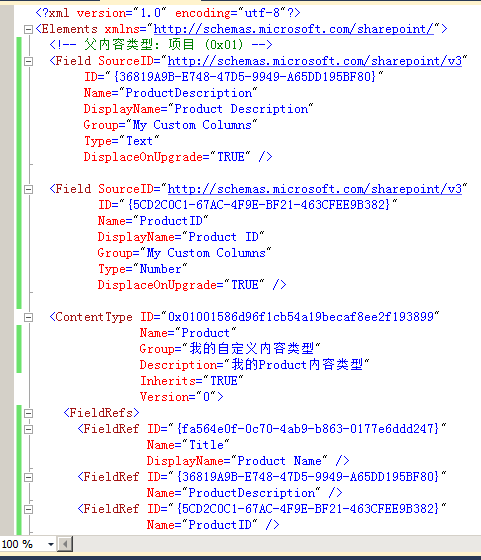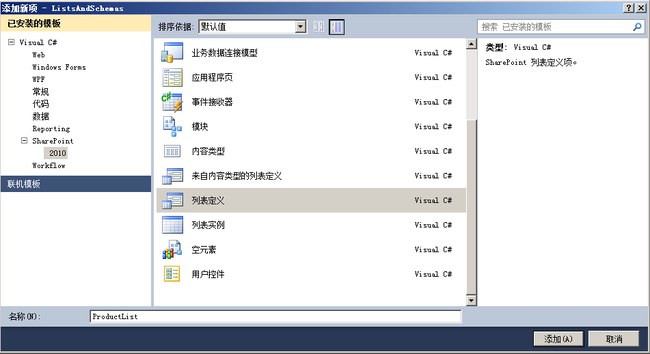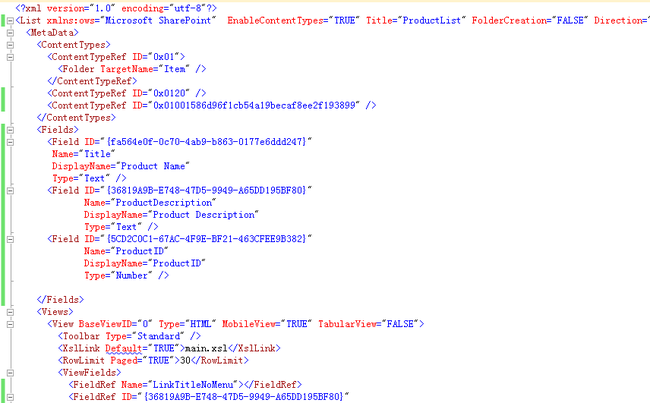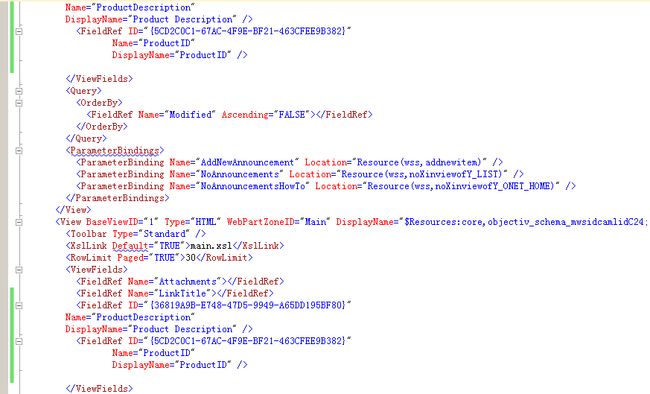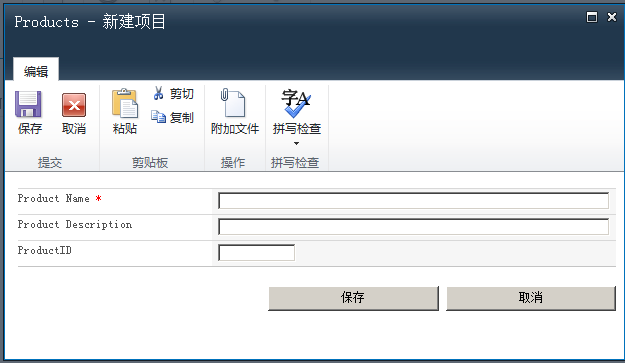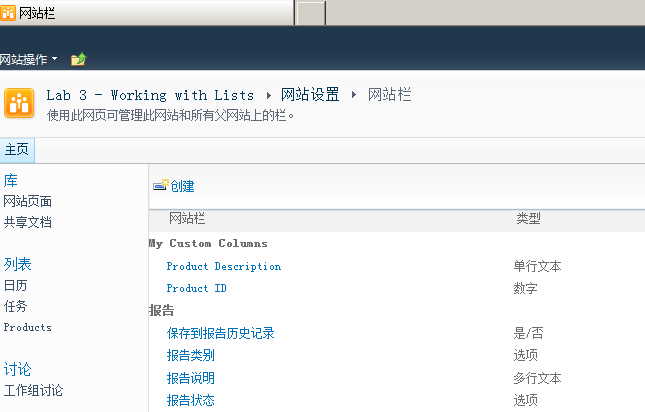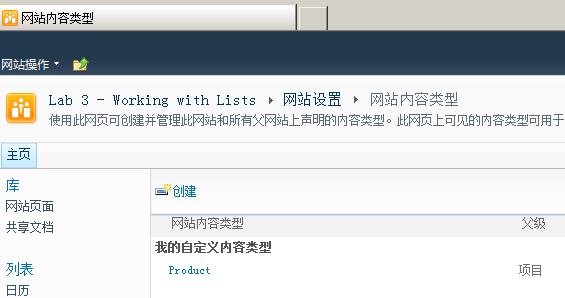- 微软Copilot两大创新功能详解:SharePoint Agents vs. Copilot Notebooks
领驭科技
microsoftcopilotsharepoint
微软Copilot正在不断进化,最近两项全新功能——SharePointAgents和CopilotNotebooks,分别聚焦于企业知识问答与项目级智能协作。它们适用场景截然不同,但又能彼此补充,构建起从“知识获取”到“内容生产”的智能化链路。很多小伙伴感觉这两个功能有些类似,今天我就来帮大家答疑解惑。✅什么是SharePointAgents?SharePointAgents是微软基于Share
- m365是什么,和o365的区别
dev.null
操作系统微软
M365(Microsoft365)是微软推出的基于云的办公套件,包含多种生产力工具,旨在帮助个人和企业提高工作效率。它包括经典的办公软件,如Word、Excel、PowerPoint、Outlook等,还提供协作和云存储服务,如OneDrive、Teams和SharePoint等。M365的主要特点包括:云存储与文件共享:通过OneDrive,用户可以存储、共享和协作编辑文档。团队协作工具:Mi
- Programmatically Upload a document with new Version to SharePoint List
weixin_30335353
c#
SearchSharePointLegacyVersions-DevelopmentandOtherProgrammingForumSearchAllSharePointProductsandTechnologiesForumsSearchAllMSDNForumsAskaquestionTuesday,April14,20096:44PMda.3vil.geniusda.3vil.genius6
- SharePoint【学习笔记】-- SharePoint 内置字段名/GUID大全
weixin_30525825
这个SharePointInternalFieldNames–SharePoint2010解决大问题了,每次找内置字段名和GUID都很麻烦,这个列表提供了汇总清单,以后查找就方便多了。这份清单列出了每个内置字段的Title(取字段值需要)、GUID(取字段对象需要)、InternalName(CAML需要)。比如,下面的例子取任务列表的“相关内容”链接:1://获取任务列表的“相关内容”链接2:G
- 【转】SharePoint 2010 内置字段名/GUID 大全
weixin_30412013
ui
【更新:原文字段清单全拷贝过来了。】这个SharePointInternalFieldNames–SharePoint2010解决大问题了,每次找内置字段名和GUID都很麻烦,这个列表提供了汇总清单,以后查找就方便多了。这份清单列出了每个内置字段的Title(取字段值需要)、GUID(取字段对象需要)、InternalName(CAML需要)。比如,下面的例子取任务列表的“相关内容”链接:1://
- Vue实现文档在线预览
认证者
vue.js前端javascript
一、OfficeWebViewer(微软)说明1说明1直接在浏览器中打开Word、PowerPoint或Excel文件,将下载链接转换为OfficeWebViewer链接以在您的网站中使用注意:在SharePoint2019中,可插入的文件类型仅限于Word、Excel和PPt,(.doc、.docx、xls、.xlsx、.pot、.potx、.ppt和.pptx)(不支持pdf)。优点:1.没有
- Alist 网盘聚合挂载神器在FreeBSD下编译安装
skywalk8163
项目实践运维服务器freebsd网盘
Alist支持各种主流网盘,全部统一管理,妈妈再也不怕我的网盘太多太乱了!Alist是一个支持各种网盘的神器,它的特点:多种存储本地存储阿里云盘OneDrive/Sharepoint(国际版,世纪互联,de,us)天翼云盘(个人云,家庭云)GoogleDrive123云盘FTP/SFTPPikPakS3Seafile又拍云对象存储WebDav(支持无API的OneDrive/SharePoint)
- 如何使用集成在 SharePoint 中的开源 ONLYOFFICE 文档替代微软 Office
ONLYOFFICE
ONLYOFFICE文档是一款开源的办公套件,在GNUAGPLv3.0下分发。它包括基于网络的查看器和协作编辑器,可用于处理文本文档、电子表格和演示文稿,与OOXML格式高度兼容。ONLYOFFICE文档可以与多种云服务集成,如Nextcloud、ownCloud、Seafile、Alfresco、Plone等,您也可以将其嵌入到您自己的解决方案中。这些编辑器也可以作为完整的效率解决方案ONLYO
- windows 安装sql server 华为云文档
linux实践操作记录
linux服务器运维
先安装net3.5,剩下安装sqlserver步骤看下面文档安装SQLServer_弹性云服务器ECS_最佳实践_搭建MicrosoftSharePointServer2016_华为云(huaweicloud.com)
- 全新SharePoint Embedded介绍
ituff
现代办公巨硬生活码代码microsoftsharepointdevelopment
SharePointEmbedded是一种为企业和独立软件供应商(ISVs)构建自定义内容应用程序的新方法。其提供了一个无头(headless)的API模式,通过在企业现有的Microsoft365租户内存储内容,将协作、安全和合规性等管理能力集成到任何应用程序中。企业可以使用SharePointEmbedded来驱动业务应用程序,为应用程序用户和负责管理这些新应用程序的系统管理员创造一个统一且熟
- 饿了么否认与字节跳动接洽收购;中国AI大模型专利数全球第一;微软SharePoint被曝严重漏洞 | 极客头条
极客日报
人工智能microsoftsharepoint
「极客头条」——技术人员的新闻圈!CSDN的读者朋友们早上好哇,「极客头条」来啦,快来看今天都有哪些值得我们技术人关注的重要新闻吧。整理|苏宓出品|CSDN(ID:CSDNnews)一分钟速览新闻点!饿了么否认与字节跳动接洽收购罗永浩暂缓AR业务转做大模型?内部人士:不实,仍专注AR研发中国电信星辰AI大模型开源消息称理想汽车成立AI技术委员会:统筹全公司AI资源、推进产品落地《王者荣耀》抖音直播
- Linux 系统之部署 ZFile 在线网盘服务
开源极客行
开源项目linux运维
一、ZFile介绍1)ZFile简介官网:https://www.zfile.vip/GitHub:https://github.com/zfile-dev/zfileZFile是一款基于Java的在线网盘程序,支持对接S3、OneDrive、SharePoint、又拍云、本地存储、FTP等存储源,支持在线浏览图片、播放音视频,文本文件等文件类型。2)ZFile特点Docker、DockerCom
- PowerBI:如何在以SharePoint文件做为数据源?
牛猫Data
PowerBIpowerbisharepoint数据分析数据可视化microsoft
问题描述:有朋友最近询问,在PowerBI中如何以SharePoint中的文件做为数据源,进行报告的设计开发?今天抽一些时间,为大家做一个样例,供大家参考。解决方案:找到将要使用的SharePoint中文件的Weblink地址,此步最为关键;打开PowerBI,通过Weblink文件地址,成功文件作为PowerBI数据源;操作步骤:1,在一个测试使用的SharePoint站点,上传我们的测试Exc
- Aspose.Cells Java去除水印和数量限制
罗政
javapython开发语言
什么是Aspose?Aspose是一家开发软件公司,提供众多屡获殊荣的API,开发人员可以使用这些API创建、编辑、转换或渲染Office、OpenOffice、PDF、图像、ZIP、CAD、XPS、EPS、PSD和更多文件格式.API可用于不同的平台,包括.NET、Java、C++、Python、PHP、Xamarin和Android、MicrosoftSharePoint的报告解决方案以及Mi
- 全新SharePoint Premium介绍
ituff
现代办公巨硬生活Data&AIsharepointmicrosoftOffice365ai
在2023年微软Ignite会议中,微软推出了SharePointPremium,这是一个人工智能平台,旨在改变你在云中的内容体验。SharePointPremium是微软Syntex的进化。什么是SharePointSharePoint是微软开发的协作和内容管理平台。自2001年以来可用,主要用于企业。它提供了一套服务,使组织能够在组织内部高效地共享和管理文档、信息和想法。SharePoint允
- Power Automate删除SharePoint Online或OneDrive for Business文件版本历史
ituff
现代办公巨硬生活PowerPlatformsharepointonedrivemicrosoftpowerautomatepowerplatform
SharePointOnline和OneDriveforBusiness支持版本控制,可以保留文件的版本历史,方便用户随时查看和恢复以前的版本。但该功能也会占用大量SharePointOnline或OneDriveforBusiness存储空间。官方删除版本历史的方法无法批量操作,故今天提供一种使用PowerAutomate来删除SharePointOnline或OneDriveforBusine
- 关于Ivanti 曝新的 MobileIron 零日漏洞,正在被恶意利用的动态情报
威胁情报收集站
威胁分析网络安全web安全
一、基本内容美国IT软件公司Ivanti于2023年8月23日提醒客户,一个关键的SentryAPI身份验证绕过漏洞正在被恶意利用。IvantiSentry(前身为MobileIronSentry)在MobileIron部署中充当MicrosoftExchangeServer等企业ActiveSync服务器或Sharepoint服务器等后端资源的守门员,它还可以充当Kerberos密钥分发中心代理
- cs环境部署
longersking
安装配置cs搭建docker
配置搭建cs工具两种方式cs工具=》狐狸工具箱,微信上搜索或者cs-OneDrive(sharepoint.com)提取密码www.ddosi.org需要云服务器(个人猜测如果是靶场的话,可以采用一台所有主机都能访问的主机作为服务端配置)非docker方式搭建将cs整个文件上传到服务器端,这里注意,最好上传版本略低的cs工具,否则会因为服务器内核问题导致无法运行,笔者采用4.7版本,即狐狸工具箱自
- SPS技术体系分析(张永康)
scott_chou
SharePointsharepointstringservice数据库文档microsoft
一、程序文件及IIS配置二、SPS数据库对象分析21.主要数据库表22.主要表及字段23.WindowsSharePointServices存储过程三、SPS封装后的对象分析31.SPS主要对象体系结构32.Microsoft.SharePoint命名空间简介33.WindowsSharePointServicesWebService简介34.SharePoint事件分析四、开发相关资源一、程序文
- SPS技术体系分析(张永康)
iteye_9207
数据库操作系统内存管理
SPS技术体系分析(张永康)2010年07月18日一、程序文件及IIS配置二、SPS数据库对象分析21.主要数据库表22.主要表及字段23.WindowsSharePointServices存储过程三、SPS封装后的对象分析31.SPS主要对象体系结构32.Microsoft.SharePoint命名空间简介33.WindowsSharePointServicesWebService简介34.Sh
- 【Microsoft Azure 的1024种玩法】四十九.在Azure中使用Azure VirtualMachines 搭建Microsoft SharePoint 2016
一只特立独行的兔先森
【MicrosoftAzure的1024种玩法】azuremicrosoftsharepoint
【简介】SharePointServer2016的设计、开发和测试以Microsoft软件即服务(SaaS)战略为核心。SharePointServer2016广泛借鉴了该经验,旨在帮助您实现更高级别的可靠性和性能,并在满足用户对更大业务移动性的需求的同时为用户提供支持,本文主要介绍了如何.在Azure中使用AzureVirtualMachines搭建MicrosoftSharePoint2016
- Dynamic Web TWAIN资讯:Web应用程序的扫描仪SDK
RoffeyYang
DynamicWebTWAINjavaweb
DynamicWebTWAIN是一个专为Web应用程序设计的TWAIN扫描识别控件。你只需在TWAIN接口写几行代码,就可以用兼容TWAIN的扫描仪扫描文档或从数码相机/采集卡中获取图像。然后用户可以编辑图像并将图像保存为多种格式,用户可保存图像到远程数据库或者SharePoint。该TWAIN控件还支持上传和处理本地图像。本文汇集了一些DynamicWebTWAIN编程方面的常见问题,并且针对这
- 从简单DEMO开始学习Power Apps【DAY 2】
m0_64916060
sharepoint
自动化云端流在完成了申请者的功能模块之后,我们需要让我们的申请能够被审核人员看见并且做出回应。同时我们需要对上传的信息以及审核回应的信息进行处理,如果完全由人力去逐个修改,那是很麻烦的。所以,我们就用到了自动化云端流。创建自动化云端流生成新的流打开PowerAutomate,创建自动化云端流,输入流名称并选择触发器为当创建项时在触发器中输入上一篇文章中在SharePoint中创建的数据源的地址,并
- SharePoint-连接Excel
小沐°
SharePoint微软sharepointexcel
PowerAutomate和PowerApps想要连接Excel表格的话,可以在OneDrive或SharePoint网站的文档中创建Excel文件,然后把Excel转换成table表格以SharePoint为例,在文档中点击新建,选择Excel工作簿填写内容,然后全选选中在上方搜索框里输入table,选择表格点击确定这样就是table结构了
- Power Automate-变量和excel表数据的应用
小沐°
PowerAutomateexcel
前提表格PowerAutomate连接excel请参考:SharePoint-连接Excel-CSDN博客需求1:计算表格中某列的和添加操作,搜索变量,选择初始化变量添加变量的名称、类型和初始值再新增操作,搜索Excel,点击查看更多选择列出表中存在的行选择提前在SharePoint网站中的文档创建的excel表格添加新操作,搜索控件,选择应用到每一个选择value然后在里面添加操作,搜索变量,选
- Making SharePoint Web Parts Interact
weixin_34348111
MakingSharePointWebPartsInteract看到www.theserverside.net上面有一篇介绍connectedWebParts开发文章《MakingSharePointWebPartsInteract》byDinoEsposito,推荐!http://www.theserverside.net/articles/showarticle.tss?id=WebParts
- Developing SharePoint WebParts using User Controls and Web Applications
lixintao200702
sharepointwebwebpartsuserapplicationdeployment
DevelopingSharePointWebPartsusingUserControlsandWebApplications92Postedbyggalipeau|Postedon18-05-2009Category:featured,sharepoint,webpart,wspbuilderIfyou’vereadmyblogsbefore,thenyouprobablyknowIamafan
- SharePoint 的 Web Parts 是什么
HoneyMoose
sharepoint
WebParts可以说是微软SharePoint的基础组件。根据微软自己的描述,WebParts是SharePoint对内容进行构建的基础,可以想想成一块一块的砖块。我们需要使用这些砖块来完成一个页面的构建。我们可以利用WebParts在SharePoint中添加文本,图片,文件,视频,甚至是动态内容。添加WebParts在完成页面布局的Section后,单击页面布局上面的Section,上的X号
- SharePoint 是什么
HoneyMoose
sharepoint
SharePoint平台使您能够以在线方式和本地方式轻松地管理和协调业务数据。因为其灵活性和易使用性,公司可以快速采用SharePoint来管理其业务数据。SharePointMicrosoft365一种基于云的服务,由Microsoft托管,适用于各种规模的企业。任何SharePointServer企业都可以订阅Microsoft365计划或独立的SharePointOnline服务,而不是在本
- SharePoint 页面中插入自定义代码
HoneyMoose
sharepoint
我们都知道SharePoint是对页面进行编辑的。对于一些有编程基础的人来说,可能需要对页面中插入代码,这样才能更好的对页面进行配置。但是在新版本的SharePointmodern页面来说,虽然我们可以插入Embed组件。但是Embed组件中是不允许提供Script和Html脚本的。只能插入iFrame框架或者URL地址。这个就非常郁闷了。管理员配置在SharePoint页面中,默认是禁用自定义脚
- Enum用法
不懂事的小屁孩
enum
以前的时候知道enum,但是真心不怎么用,在实际开发中,经常会用到以下代码:
protected final static String XJ = "XJ";
protected final static String YHK = "YHK";
protected final static String PQ = "PQ";
- 【Spark九十七】RDD API之aggregateByKey
bit1129
spark
1. aggregateByKey的运行机制
/**
* Aggregate the values of each key, using given combine functions and a neutral "zero value".
* This function can return a different result type
- hive创建表是报错: Specified key was too long; max key length is 767 bytes
daizj
hive
今天在hive客户端创建表时报错,具体操作如下
hive> create table test2(id string);
FAILED: Execution Error, return code 1 from org.apache.hadoop.hive.ql.exec.DDLTask. MetaException(message:javax.jdo.JDODataSto
- Map 与 JavaBean之间的转换
周凡杨
java自省转换反射
最近项目里需要一个工具类,它的功能是传入一个Map后可以返回一个JavaBean对象。很喜欢写这样的Java服务,首先我想到的是要通过Java 的反射去实现匿名类的方法调用,这样才可以把Map里的值set 到JavaBean里。其实这里用Java的自省会更方便,下面两个方法就是一个通过反射,一个通过自省来实现本功能。
1:JavaBean类
1 &nb
- java连接ftp下载
g21121
java
有的时候需要用到java连接ftp服务器下载,上传一些操作,下面写了一个小例子。
/** ftp服务器地址 */
private String ftpHost;
/** ftp服务器用户名 */
private String ftpName;
/** ftp服务器密码 */
private String ftpPass;
/** ftp根目录 */
private String f
- web报表工具FineReport使用中遇到的常见报错及解决办法(二)
老A不折腾
finereportweb报表java报表总结
抛砖引玉,希望大家能把自己整理的问题及解决方法晾出来,Mark一下,利人利己。
出现问题先搜一下文档上有没有,再看看度娘有没有,再看看论坛有没有。有报错要看日志。下面简单罗列下常见的问题,大多文档上都有提到的。
1、没有返回数据集:
在存储过程中的操作语句之前加上set nocount on 或者在数据集exec调用存储过程的前面加上这句。当S
- linux 系统cpu 内存等信息查看
墙头上一根草
cpu内存liunx
1 查看CPU
1.1 查看CPU个数
# cat /proc/cpuinfo | grep "physical id" | uniq | wc -l
2
**uniq命令:删除重复行;wc –l命令:统计行数**
1.2 查看CPU核数
# cat /proc/cpuinfo | grep "cpu cores" | u
- Spring中的AOP
aijuans
springAOP
Spring中的AOP
Written by Tony Jiang @ 2012-1-18 (转)何为AOP
AOP,面向切面编程。
在不改动代码的前提下,灵活的在现有代码的执行顺序前后,添加进新规机能。
来一个简单的Sample:
目标类:
[java]
view plain
copy
print
?
package&nb
- placeholder(HTML 5) IE 兼容插件
alxw4616
JavaScriptjquery jQuery插件
placeholder 这个属性被越来越频繁的使用.
但为做HTML 5 特性IE没能实现这东西.
以下的jQuery插件就是用来在IE上实现该属性的.
/**
* [placeholder(HTML 5) IE 实现.IE9以下通过测试.]
* v 1.0 by oTwo 2014年7月31日 11:45:29
*/
$.fn.placeholder = function
- Object类,值域,泛型等总结(适合有基础的人看)
百合不是茶
泛型的继承和通配符变量的值域Object类转换
java的作用域在编程的时候经常会遇到,而我经常会搞不清楚这个
问题,所以在家的这几天回忆一下过去不知道的每个小知识点
变量的值域;
package 基础;
/**
* 作用域的范围
*
* @author Administrator
*
*/
public class zuoyongyu {
public static vo
- JDK1.5 Condition接口
bijian1013
javathreadConditionjava多线程
Condition 将 Object 监视器方法(wait、notify和 notifyAll)分解成截然不同的对象,以便通过将这些对象与任意 Lock 实现组合使用,为每个对象提供多个等待 set (wait-set)。其中,Lock 替代了 synchronized 方法和语句的使用,Condition 替代了 Object 监视器方法的使用。
条件(也称为条件队列或条件变量)为线程提供了一
- 开源中国OSC源创会记录
bijian1013
hadoopsparkMemSQL
一.Strata+Hadoop World(SHW)大会
是全世界最大的大数据大会之一。SHW大会为各种技术提供了深度交流的机会,还会看到最领先的大数据技术、最广泛的应用场景、最有趣的用例教学以及最全面的大数据行业和趋势探讨。
二.Hadoop
&nbs
- 【Java范型七】范型消除
bit1129
java
范型是Java1.5引入的语言特性,它是编译时的一个语法现象,也就是说,对于一个类,不管是范型类还是非范型类,编译得到的字节码是一样的,差别仅在于通过范型这种语法来进行编译时的类型检查,在运行时是没有范型或者类型参数这个说法的。
范型跟反射刚好相反,反射是一种运行时行为,所以编译时不能访问的变量或者方法(比如private),在运行时通过反射是可以访问的,也就是说,可见性也是一种编译时的行为,在
- 【Spark九十四】spark-sql工具的使用
bit1129
spark
spark-sql是Spark bin目录下的一个可执行脚本,它的目的是通过这个脚本执行Hive的命令,即原来通过
hive>输入的指令可以通过spark-sql>输入的指令来完成。
spark-sql可以使用内置的Hive metadata-store,也可以使用已经独立安装的Hive的metadata store
关于Hive build into Spark
- js做的各种倒计时
ronin47
js 倒计时
第一种:精确到秒的javascript倒计时代码
HTML代码:
<form name="form1">
<div align="center" align="middle"
- java-37.有n 个长为m+1 的字符串,如果某个字符串的最后m 个字符与某个字符串的前m 个字符匹配,则两个字符串可以联接
bylijinnan
java
public class MaxCatenate {
/*
* Q.37 有n 个长为m+1 的字符串,如果某个字符串的最后m 个字符与某个字符串的前m 个字符匹配,则两个字符串可以联接,
* 问这n 个字符串最多可以连成一个多长的字符串,如果出现循环,则返回错误。
*/
public static void main(String[] args){
- mongoDB安装
开窍的石头
mongodb安装 基本操作
mongoDB的安装
1:mongoDB下载 https://www.mongodb.org/downloads
2:下载mongoDB下载后解压
- [开源项目]引擎的关键意义
comsci
开源项目
一个系统,最核心的东西就是引擎。。。。。
而要设计和制造出引擎,最关键的是要坚持。。。。。。
现在最先进的引擎技术,也是从莱特兄弟那里出现的,但是中间一直没有断过研发的
- 软件度量的一些方法
cuiyadll
方法
软件度量的一些方法http://cuiyingfeng.blog.51cto.com/43841/6775/在前面我们已介绍了组成软件度量的几个方面。在这里我们将先给出关于这几个方面的一个纲要介绍。在后面我们还会作进一步具体的阐述。当我们不从高层次的概念级来看软件度量及其目标的时候,我们很容易把这些活动看成是不同而且毫不相干的。我们现在希望表明他们是怎样恰如其分地嵌入我们的框架的。也就是我们度量的
- XSD中的targetNameSpace解释
darrenzhu
xmlnamespacexsdtargetnamespace
参考链接:
http://blog.csdn.net/colin1014/article/details/357694
xsd文件中定义了一个targetNameSpace后,其内部定义的元素,属性,类型等都属于该targetNameSpace,其自身或外部xsd文件使用这些元素,属性等都必须从定义的targetNameSpace中找:
例如:以下xsd文件,就出现了该错误,即便是在一
- 什么是RAID0、RAID1、RAID0+1、RAID5,等磁盘阵列模式?
dcj3sjt126com
raid
RAID 1又称为Mirror或Mirroring,它的宗旨是最大限度的保证用户数据的可用性和可修复性。 RAID 1的操作方式是把用户写入硬盘的数据百分之百地自动复制到另外一个硬盘上。由于对存储的数据进行百分之百的备份,在所有RAID级别中,RAID 1提供最高的数据安全保障。同样,由于数据的百分之百备份,备份数据占了总存储空间的一半,因而,Mirror的磁盘空间利用率低,存储成本高。
Mir
- yii2 restful web服务快速入门
dcj3sjt126com
PHPyii2
快速入门
Yii 提供了一整套用来简化实现 RESTful 风格的 Web Service 服务的 API。 特别是,Yii 支持以下关于 RESTful 风格的 API:
支持 Active Record 类的通用API的快速原型
涉及的响应格式(在默认情况下支持 JSON 和 XML)
支持可选输出字段的定制对象序列化
适当的格式的数据采集和验证错误
- MongoDB查询(3)——内嵌文档查询(七)
eksliang
MongoDB查询内嵌文档MongoDB查询内嵌数组
MongoDB查询内嵌文档
转载请出自出处:http://eksliang.iteye.com/blog/2177301 一、概述
有两种方法可以查询内嵌文档:查询整个文档;针对键值对进行查询。这两种方式是不同的,下面我通过例子进行分别说明。
二、查询整个文档
例如:有如下文档
db.emp.insert({
&qu
- android4.4从系统图库无法加载图片的问题
gundumw100
android
典型的使用场景就是要设置一个头像,头像需要从系统图库或者拍照获得,在android4.4之前,我用的代码没问题,但是今天使用android4.4的时候突然发现不灵了。baidu了一圈,终于解决了。
下面是解决方案:
private String[] items = new String[] { "图库","拍照" };
/* 头像名称 */
- 网页特效大全 jQuery等
ini
JavaScriptjquerycsshtml5ini
HTML5和CSS3知识和特效
asp.net ajax jquery实例
分享一个下雪的特效
jQuery倾斜的动画导航菜单
选美大赛示例 你会选谁
jQuery实现HTML5时钟
功能强大的滚动播放插件JQ-Slide
万圣节快乐!!!
向上弹出菜单jQuery插件
htm5视差动画
jquery将列表倒转顺序
推荐一个jQuery分页插件
jquery animate
- swift objc_setAssociatedObject block(version1.2 xcode6.4)
啸笑天
version
import UIKit
class LSObjectWrapper: NSObject {
let value: ((barButton: UIButton?) -> Void)?
init(value: (barButton: UIButton?) -> Void) {
self.value = value
- Aegis 默认的 Xfire 绑定方式,将 XML 映射为 POJO
MagicMa_007
javaPOJOxmlAegisxfire
Aegis 是一个默认的 Xfire 绑定方式,它将 XML 映射为 POJO, 支持代码先行的开发.你开发服 务类与 POJO,它为你生成 XML schema/wsdl
XML 和 注解映射概览
默认情况下,你的 POJO 类被是基于他们的名字与命名空间被序列化。如果
- js get max value in (json) Array
qiaolevip
每天进步一点点学习永无止境max纵观千象
// Max value in Array
var arr = [1,2,3,5,3,2];Math.max.apply(null, arr); // 5
// Max value in Jaon Array
var arr = [{"x":"8/11/2009","y":0.026572007},{"x"
- XMLhttpRequest 请求 XML,JSON ,POJO 数据
Luob.
POJOjsonAjaxxmlXMLhttpREquest
在使用XMlhttpRequest对象发送请求和响应之前,必须首先使用javaScript对象创建一个XMLHttpRquest对象。
var xmlhttp;
function getXMLHttpRequest(){
if(window.ActiveXObject){
xmlhttp:new ActiveXObject("Microsoft.XMLHTTP
- jquery
wuai
jquery
以下防止文档在完全加载之前运行Jquery代码,否则会出现试图隐藏一个不存在的元素、获得未完全加载的图像的大小 等等
$(document).ready(function(){
jquery代码;
});
<script type="text/javascript" src="c:/scripts/jquery-1.4.2.min.js&quo
